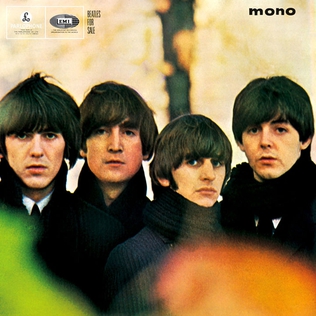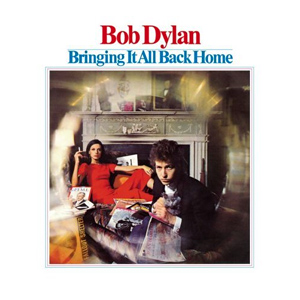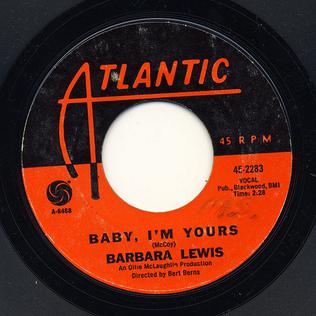
Beatles for Sale is the fourth studio album by the English rock band the Beatles. It was released on 4 December 1964 in the United Kingdom on EMI's Parlophone label. The album marked a departure from the upbeat tone that had characterised the Beatles' previous work, partly due to the band's exhaustion after a series of tours that had established them as a worldwide phenomenon in 1964. Beatles for Sale was not widely available in the US until 1987, when the Beatles' catalogue was standardised for release on CD. Instead, eight of the album's fourteen tracks appeared on Capitol Records' concurrent release, Beatles '65, issued in North America only.

Bringing It All Back Home is the fifth studio album by American singer-songwriter Bob Dylan. It was released on March 22, 1965, by Columbia Records.

Beatles '65 is an album by the English rock band the Beatles that was issued in the United States and Canada in December 1964. Released as the North American alternative to Beatles for Sale, it was the band's fifth studio album culled by Capitol Records in the US from the Beatles' EMI releases. The LP was also issued in West Germany on the Odeon label.

"Back in My Arms Again" is a 1965 song recorded by The Supremes for the Motown label.

Kinda Kinks is the second album by English rock band the Kinks, released in 1965. Recorded and released within two weeks after returning from a tour in Asia, Ray Davies and the band were not satisfied with the production. The single "Tired of Waiting for You" was a #1 hit on the UK Singles Charts.

The Temptin' Temptations is the third studio album by The Temptations for the Gordy (Motown) label released in 1965. The album includes several of the group's hits from 1965, and also includes a handful of singles that were not included on the Temptations' first 1965 album, The Temptations Sing Smokey. Among these are the 1964 singles "Girl " and "I'll Be in Trouble"; and the 1965 singles "Since I Lost My Baby", and "My Baby". Seven of the album's 12 tracks had previously been released as singles and their B-sides, though "My Baby" preceded the album only by a month.

Flowers is the second compilation album by the Rolling Stones, released in the summer of 1967. The group recorded the songs at various studios dating back to 1965. Three of the songs had never been released: "My Girl", "Ride On, Baby" and "Sittin' on a Fence", the first of which was recorded in May 1965 during the sessions for "Satisfaction", and the other two of which were recorded in December 1965 during the first lot of Aftermath sessions. The rest of the album tracks either appeared as singles or had been omitted from the American versions of Aftermath and Between the Buttons.

More Hits by The Supremes is the sixth studio album by Motown singing group The Supremes, released in 1965. The album includes two number-one hits: "Stop! In the Name of Love" and "Back in My Arms Again", as well as the Top 20 single "Nothing but Heartaches".
"Come Fly with Me" is a 1958 popular song composed by Jimmy Van Heusen, with lyrics by Sammy Cahn.

"Baby I'm Yours" is a song written by Van McCoy which was a hit in 1965 for Barbara Lewis, the original recording artist. The song was featured in the 1995 film The Bridges of Madison County and was included on the soundtrack album. It was also featured in the TV movies The Midnight Hour (1985) and An American Crime (2007), as well as briefly featured in Baby Driver.
"It's All Over Now, Baby Blue" is a song written and performed by Bob Dylan and featured on his Bringing It All Back Home album, released on March 22, 1965, by Columbia Records. The song was recorded on January 15, 1965, with Dylan's acoustic guitar and harmonica and William E. Lee's bass guitar the only instrumentation. The lyrics were heavily influenced by Symbolist poetry and bid farewell to the titular "Baby Blue". There has been much speculation about the real life identity of "Baby Blue", with possibilities including Joan Baez, David Blue, Paul Clayton, Dylan's folk music audience, and even Dylan himself.

"Baby, Please Don't Go" is a traditional blues song that was popularized by Delta blues musician Big Joe Williams in 1935. Many cover versions followed, leading to its description as "one of the most played, arranged, and rearranged pieces in blues history" by French music historian Gérard Herzhaft.

Away We a Go-Go is a 1966 album by Smokey Robinson & The Miracles. The album features the singles "(Come 'Round Here) I'm the One You Need", a Billboard Top 20 Pop hit, written and produced by Holland-Dozier-Holland; and "Whole Lot of Shakin' in My Heart ", written and produced by Frank Wilson. The album uses a different take of "I'm the One You Need" than what was issued on the single. A third single was planned for release from this album, the tune "More, More, More ", cataloged as Tamla T-54005, but the single was never released. It was later covered by the regional group Bob Brady and The Con Chords. Still another single from this album, the Stevie Wonder/Ivy Jo Hunter composition of "Can You Love A Poor Boy", was released to radio stations as a special Disc Jockey Advanced Single, Tamla T-540, but was never given an official catalog number for general release. It too, inspired cover versions by Gil Bernal and Ronnie Walker.

"Baby, Come Back" is a song by the English band The Equals from their 1968 album Baby Come Back. Written by Eddy Grant, the song was originally released as a B-side in 1966 and was later released as a single in continental Europe before being released as a single in the UK in 1968. "Baby, Come Back" charted in multiple countries, including no. 1 in the Belgian, Rhodesian, and UK charts in 1967 and 1968.
Baby Come Back may refer to:

"Baby Don't Go" is a song written by Sonny Bono and recorded by Sonny & Cher. It was first released on Reprise Records in 1964 and was a minor regional hit. Then following the duo's big success with "I Got You Babe" in the summer of 1965, "Baby Don't Go" was re-released by Reprise later that year and became another huge hit for Sonny & Cher, reaching the top ten in the U.S. and doing well in the UK and elsewhere, going as far as reaching number one in Canada.
Come On Do the Jerk was a 1964 song recorded by R&B group the Miracles on Motown Records' Tamla label subsidiary. A single-only release, it did not appear on any original Miracles studio album, and was the group's last single release of 1964.

Baby, Come Back is an album by British group The Equals, which was released in the U.S. by RCA Victor, who had obtained the rights to manufacture and distribute the album in all of the Americas from the band's British label, President Records.
Oh Baby, O Baby, Ooh Baby, Ooh Baby Baby, or Ooh Ooh Baby may refer to:

The Return of Rock is the fourth album by Jerry Lee Lewis released on the Smash label in 1965.














